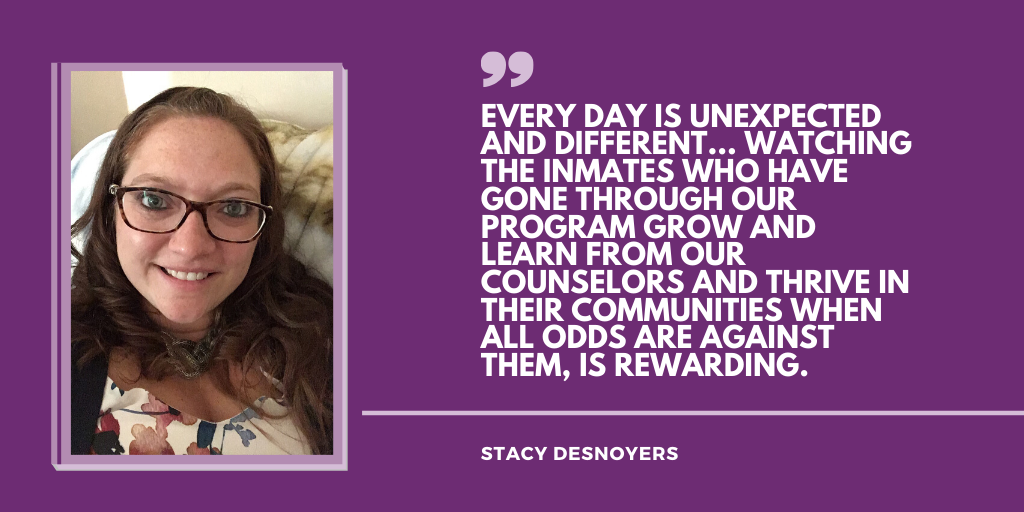Throughout all of our programs, Spectrum Health Systems has a strong and tightknit workforce. This is especially true for our Recovery Support Navigators, who work directly with inmates as they break through the walls of drug and alcohol addiction and reclaim their lives. Program Director, Stacy Desnoyers, opens up about her career path, its challenges and rewards, and her fantastic team.
What is a Program Director for the Medication-Assisted Treatment Reentry Initiative (MATRI)?
As the Program Director for the MATRI program, I manage and supervise ten Recovery Support Navigators, who work with inmates with a history of a substance use disorder (SUD), before and after their release from a state correctional facility. The Recovery Support Navigator role first began in 2014 and it continues to evolve to address the current needs of the Department of Correction (DOC) and program participants.
My staff and I work closely with the DOC to ensure coordination and compliance of the overall program. With nine Substance Abuse Counselors, the program facilitates group counseling on a regular basis.
What is Substance Use Disorder treatment like and how is Spectrum different?
For over 50 years, Spectrum Health Systems has offered a wide range of community-based treatment for individuals with substance use disorders. In 1993, Spectrum developed specialized programming for offenders, beginning with the Correctional Recovery Academy (CRA). Currently, our contract with the Massachusetts DOC allows us to treat inmates in 15 prisons and help them on the path to recovery.
The CRA is a six- to nine-month in-prison residential treatment program. Participants attend a wide range of groups focusing on anger management, criminal addictive thinking, substance use education, recidivism reduction, vocational education and more.
In the reentry unit, we focus on inmates in maximum security and help them prepare for sustained recovery and successful reintegration back into the community following their release. There is also the Secure Adjustment Unit, which provides programming within a secure environment, but in lieu of restrictive housing.
All of our programming is implemented with the intention of reducing recidivism. Our curriculum is geared toward reentry and recovery. We also discuss job readiness which includes resume building and preparing for a job search.
What does a typical day look like? What are the most rewarding and challenging aspects of the job?
My favorite part of the job, besides working with a fun, determined, caring, and cohesive team, is that every day is unexpected and different. I may start my day at one of the prisons meeting with inmates and a Recovery Support Navigator and then I’ll go to another meeting with a client in the community who has successfully completed the program a year after their release. I am always on the road, supporting our Recovery Support Navigators and helping them best serve our program participants.
From the moment an inmate starts treatment all the way to a year post-release, the Recovery Support Navigator is there to provide support and assistance. Many inmates in recovery can feel defeated and have difficulty utilizing healthy coping mechanisms and proper tools to continue recovery outside the walls of prison. Watching inmates who have gone through our program grow and learn from our counselors and thrive in their communities when all odds are against them, is rewarding.
Like any job, a career in addiction treatment can be challenging, especially when working inside a prison. The need for treatment is extremely high within the inmate population, but so many are passionate and willing to make a difference. To prevent burnout, I encourage my staff to take time to enjoy their vacation time and practice self-care. A well-cared for employee means well-cared for clients.
Why is it important to provide addiction treatment services to inmates?
Recovery is a lifelong process and for many inmates, being in a prison setting can be a trigger for their addiction. Spectrum steps in and provides clients with the tools they need to mitigate cravings for harmful substances and help them re-integrate into society when their time in prison is up.
Addiction is often linked to recidivism. Even for people who are not diagnosed with an SUD, addiction and drugs can be a big part of their lifestyle and environment. If someone does not have the tools to help them take control of their life – like finding a good job, coping with their mental health issues and past trauma – they can find themselves back in prison for similar offenses.
It’s like moving to a new country. Coming out of prison and our program for the first time is a big change to their lifestyle. They have a whole new set of rules, regulations, and ways of living that they’ve never had before. It takes time, it isn’t easy, and it requires a lot of work to do the right thing.
From Recovery Support Navigator to Program Director, Stacy has remained eager and passionate about her career. Over the years, Stacy has made strong connections with clients and the communities we serve. We’re grateful to have Stacy on our team and so willing to make a difference.
For more information about Spectrum’s correctional treatment programs, visit www.spectrumcorrections.org. For current job openings at Spectrum, visit our careers page at www.spectrumhealthsystems.org.



